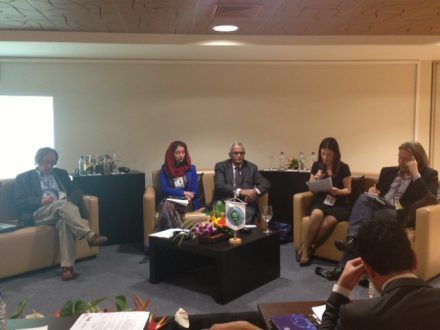PRI at the IPU: Re-thinking drugs policies: lively debate among parliamentarians in Quito

At the Assembly of the Inter-Parliamentary Union in Quito, Ecuador, an interesting panel discussion is taking place on “The legalisation of drugs: Can it help curb organised crime?” The room is cramped with parliamentarians from the globe.
Introduced by four expert panelists from Afghanistan, Serbia, Uruguay and Mexico, the debate seeks to break the taboo and discuss whether the ‘war on drugs’ has been a successful approach to counter the global drug problem. Speakers and delegates are highlighting the impact on environment, health, community relations, equality, democratic stability – and many question the approach taken in the last 50 years, which has sought to eliminate the use of drugs and related organised crime by criminal sanctions. The assessment seems to prevail that after 50 years of this approach, there are more drug users, more weapons, bigger markets, and greater harm to the most vulnerable.
PRI also delivered a statement, flagging the often disproportionate criminalisation, with little differentiation between use and possession on one end of the scale and large-scale commercial trafficking in drugs at the other end. PRI also flagged the link between substance abuse and poverty, the indirect contribution of the criminalisation of use, drug treatment and harm reduction activities to the global HIV/ AIDS epidemic; and also our concern that the death penalty is stil limposed for drug related offences in 33 countries.
Download our new briefing: The unintended negative consequences of the war on drugs: mass criminalisation and punitive sentencing policies